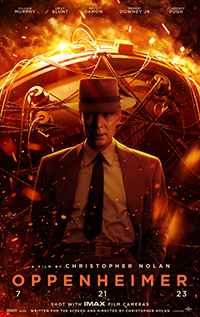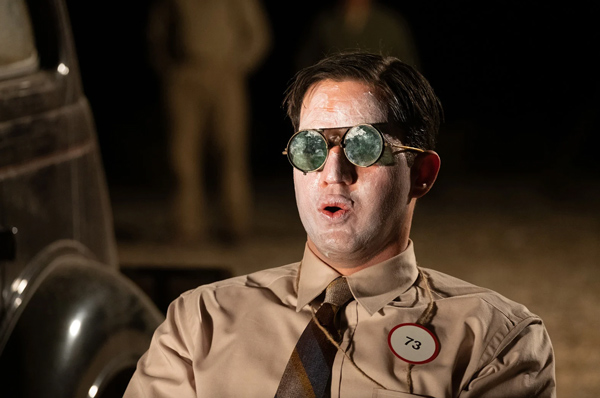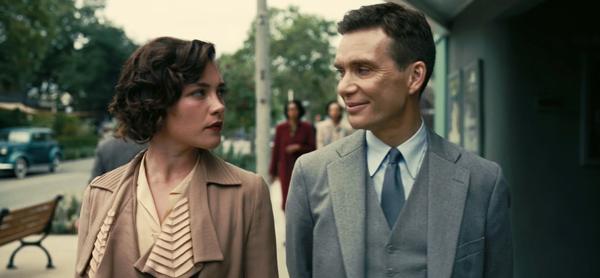Bombs Away: How Christopher Nolan Stopped Worrying and Love the Bomb
 For his highly anticipated twelfth feature, Oppenheimer, Christopher Nolan returns to the annals of history to probe the rise and fall of its titular theoretical physicist, perhaps better known by the moniker ‘father of the atomic bomb.’ Following 2017’s Dunkirk, it’s another expertly crafted period reenactment of the key figures involved in a transformative historical moment which changed the aspects of not only scientific understanding but political maneuverings between fickle world powers. As such, it’s Nolan in a somewhat less sensational form, cleaved to historical accuracy instead of his superficially complex genre efforts, which would suggest an adherence to more intricate characterizations than we’re used to in Nolan’s universe. Alas, such is not the case.
For his highly anticipated twelfth feature, Oppenheimer, Christopher Nolan returns to the annals of history to probe the rise and fall of its titular theoretical physicist, perhaps better known by the moniker ‘father of the atomic bomb.’ Following 2017’s Dunkirk, it’s another expertly crafted period reenactment of the key figures involved in a transformative historical moment which changed the aspects of not only scientific understanding but political maneuverings between fickle world powers. As such, it’s Nolan in a somewhat less sensational form, cleaved to historical accuracy instead of his superficially complex genre efforts, which would suggest an adherence to more intricate characterizations than we’re used to in Nolan’s universe. Alas, such is not the case.
While based on the 2005 publication American Prometheus: The Triumph and Tragedy of J. Robert Oppenheimer by Kai Bird and Martin J. Sherwin, Nolan’s treatment puts the physicist under an extreme magnifying glass, with Cillian Murphy more than aptly portraying a brilliant man plagued by his decisions to create a weapon of mass destruction only to be later maligned for his suspected views and political affiliation.
Nolan begins with Oppenheimer’s (Murphy) early days as a disillusioned student in Cambridge under the tutor Patrick Blackett (James D’Arcy), when a chance meeting with Danish physicist Niels Bohr (Kenneth Branagh) leads him to the University of Gottingen in Germany, where he meets Werner Heisenberg (Matthias Schweighöfer), who would eventually be dispatched by the Nazi party in the nuclear arms race during WWII. When returning to the US, Oppenheimer would spearhead a course on quantum physics at Berkeley, heretofore a subject no one was studying, meanwhile engaged in a clandestine affair with Jean Tatlock (Florence Pugh) who he meets at a Communist party gathering.

Approached by Leslie Groves (Matt Damon), who was selected by the US Army Corps to lead the secretive Manhattan Project, Oppenheimer is headhunted to build the atomic bomb, selecting a myriad of top tier scientists and relocate them to Los Alamos, where their secret research would eventually lead to the atomic bomb (the film quietly asserts the area was uninhabited, which is a convenient way to sidestep the ripple effects for a smattering of Hispanic homesteaders and indigenous peoples). The Trinity test is a success, leading President Harry S. Truman (Gary Oldman) to drop two atomic bombs on Japan and therefore end WWII. Oppenheimer, who married biologist Katherine ‘Kitty’ Puening (Emily Blunt), eventually courts the ire of Lewis Strauss (Robert Downey Jr.), chairman of the US Atomic Energy Commission who would appoint Oppenheimer to the commission only to be publicly humiliated by him. In response, Strauss orchestrated a nefarious hearing in 1954 to have Oppenheimer’s secret clearance revoked, silencing the scientist and ruining his reputation. Only five years later, Strauss’ actions would backfire on him during his confirmation hearing for the US Senate as President Eisenhower’s Secretary of Commerce when his actions were made public.

There’s no doubt about Oppenheimer being an exquisite visual experience. Lensed by Nolan’s regular DP Hoyte Van Hoytema, there are breathtaking visual sequences indelibly enhanced by sound designer Randy Torres which should make this a required theatrical screening. And yet, there are the usual problems which tend to nag at the periphery of Nolan’s ventures regarding characterization dragged down by a distracting ensemble experience where most of the notable names and faces have nothing to do but flit across the screen and try their darndest to make an impression.
More glaring, and somewhat egregious, are Nolan’s cartoonish female characters, with Emily Blunt as a caricatured alcoholic wife and mother who mainlines his dialogue like she’s trying to be Dorothy Parker dumbed down to television courtroom dialogue. Nolan often seems invested in creating women who are always prominent on the sidelines, motivating composites for men who either want to desire or destroy them, and Blunt joins a pool previously occupied by Elizabeth Debicki, Marion Cotillard and Anne Hathaway, all strong women whose hands are ultimately tied, their interests neglected. In Oppenheimer we also have Florence Pugh as a communist colleague and love interest for the physicist, though their courtship is marked by an unwanted exchange of flowers about as silly as the ‘pas de fleurs’ bit between Matthias Schoenaerts and Adele Exarchopolous in Michael R. Roskam’s Racer and the Jailbird (2017). Olivia Thirlby is on hand as a lady scientist on the Manhattan Project, but she may as well be a phantom.

Murphy, who previously worked with Nolan as the villain Scarecrow in his Batman films, carries the film confidently, giving an unfussy, matter-of-fact performance as Oppenheimer (even if he sometimes appears to be a bit too old for scenes from the physicist’s youthful student days). On the other hand, Robert Downey Jr. is allowed to go complete ham by the end of the film as Admiral Lewis Strauss, a sneaky, backstabbing hater of Oppenheimer (and perhaps all scientists in general), reflecting Nolan’s blindspots as a screenwriter.
The last hour of Oppenheimer juxtaposes the ruination of both men’s reputations in separate hearings meant ‘not to convict, but to deny’ their professional success. It’s a rather cold, hard end point considering the anxiety and excitement Nolan builds towards the first major test of the atomic bomb prior to its use on Nagasaki and Hiroshima (neither of which we see, instead crystallized in the imagined nightmares of Oppenheimer, envisioning how his creation eradicates life, albeit in less sensational ways than something James Cameron fashioned in 1991’s Terminator 2: Judgment Day).
★★★½/☆☆☆☆☆


